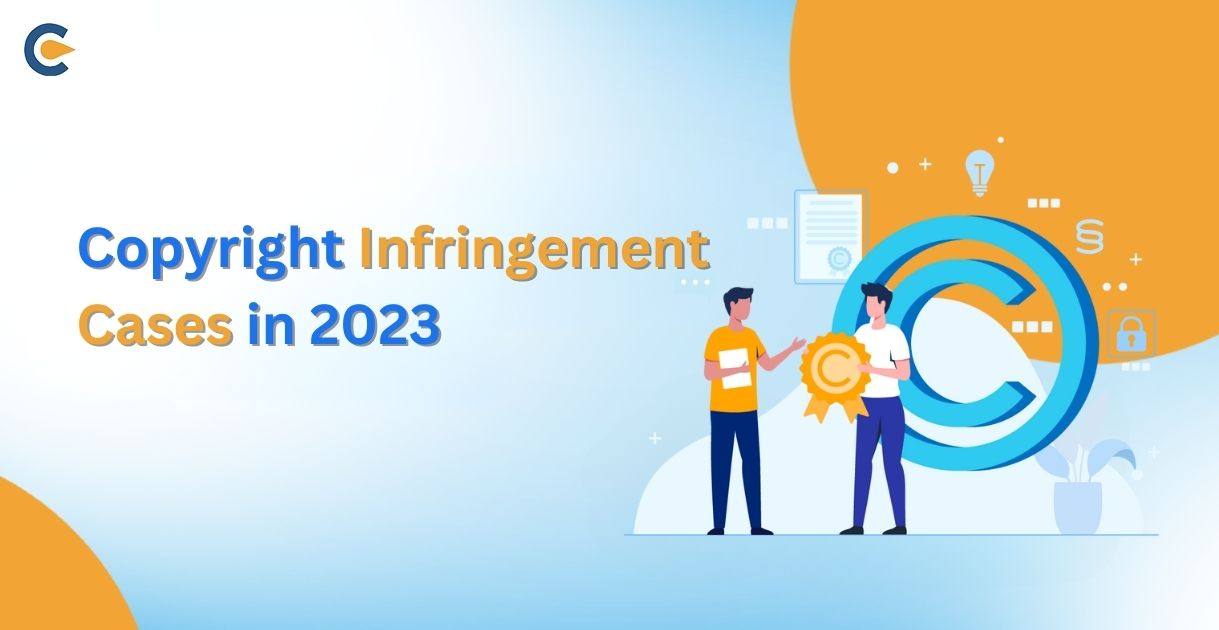Infringement of rights occurs when someone uses, distributes, exhibits, or performs copyrighted material without permission. Examples of copyrighted content include downloading or disseminating copyrighted content online, using images, videos, or graphics without authorization, and making unauthorized copies of music, films, books, or other creative works.
Copyright holders in India are the only ones with the authority to sell, publish, and reproduce their works. Unauthorized use of copyrighted content infringes on the rights of the owner and may give rise to civil and criminal fines in court. To prevent copyright infringement, it’s crucial to get the necessary consent and licenses before utilizing someone else’s creative work.
Copyright Infringement Cases in 2024
Every year, many copyright infringement cases are adjudicated in the courts in India. Some of the key copyright infringement cases in 2023 are:
- Bolt Technology Ou v/s Ujoy Technology Private Limited & Ors.
In this copyright infringement case, Bombay High Court upheld writers’ and composers’ rights in a historic case involving copyright infringement, highlighting the writers’ right to income when sound recordings are aired on radio to the general public. In this copyright infringement case, the plaintiff contended that a prior misunderstanding in the IPRS v. Eastern Indian Motion Pictures Association case was corrected by the 2012 amendment to the Copyright Act, 1957, notably the insertion of Sections 17, 18, and 19. In this copyright infringement case, they had mistakenly inferred that, in accordance with Sections 17(b) and 17(c) of the Act, writers lose their rights if their creations are included in a cinematograph film.
In the copyright infringement case, the court ruled categorically that any public radio broadcast of a sound recording is a use of the underlying literary and musical works. The court also made it clear that writers are entitled to royalties for any use of their works outside of a movie theatre, as shown by the proviso inserted to Section 18(1) of the Act that states, “with the cinematograph film in a cinema hall.” This copyright infringement case highlights copyright holders’ rights in the changing audiovisual distribution landscape and sets a major precedent in their favour.
- Tata Sia Airlines Limited v/s Union of India
The Delhi High Court turned down a motion picture producer’s request for an injunction against Harper Collins Publishers over the novelization of the movie “Nayak” in a landmark copyright infringement case. The producers, who hired Satyajit Ray to create the script, asserted ownership of the property and alleged infringement. On the other hand, the defendants said that since Ray wrote the script alone, the copyright belonged to him. It then passed to his son and society, who granted him a license for a novelization. In the copyright infringement case, Section 13(4) of the Copyright Act was cited. The court in this copyright infringement case upheld the screenplay copyright’s independence, setting a precedent for similar issues in the future involving underlying works and film adaptations.
- Shemaroo Entertainment Limited v/s Super Cassettes Industries Pvt Ltd Ors
The Bombay High Court denied Shemaroo Entertainment Ltd.’s request for an ad-interim injunction against Super Cassettes Industries Pvt. Ltd. in a recent copyright infringement case. Alleging the defendant’s improper use, the plaintiff claimed copyright ownership of music from 24 different films. The plaintiff failed to file the lawsuit in a timely manner; there was a five-year wait, and no assignment documents confirming ownership were provided. Hence, the court decided to side with the defendant. The court rejected the plaintiff’s request for an ad-interim injunction, citing the lack of supporting documentation and raising worries about the prolonged litigation in this copyright infringement case.
Copyright Registration with Corpbiz
Corpbiz is an easy-to-use website that streamlines the intricate process of copyright registration by providing step-by-step guidance and expert assistance. By guaranteeing legal compliance, it helps people and companies safeguard their creative efforts while saving time and effort. The platform stands out for its distinct commitment to usability and accessibility, providing individualized support and effective documentation management. Corpbiz is a dependable solution that enables customers to protect their intellectual property quickly and confidently in today’s competitive market.
Frequently Asked Questions
- How do I report copyright infringement in India?
The copyright infringement lawsuit ought to be brought before the originating jurisdiction High Court or the relevant District Court.
- What is the Indian statute of limitations on copyright infringement?
A period of three years from the date of infringement is the statute of limitations for bringing the lawsuit. The 3-year statute of limitations would start on the date of the last instance of copyright infringement when the cause of action for filing a lawsuit is recurrent or continuous in character.
- Is copyright violation in India punishable with imprisonment?
The minimum penalty for copyright infringement is six months in jail, which can go up to three years, and a minimum fine of Rs. 50,000, which can go up to Rs. 2 lakhs when the rights owner brings a criminal complaint for copyright infringement.
- Is copyright infringement subject to bail?
In Jithendra Prasad Singh v. State of Assam (2003), the High Court decided that copyright infringement is not punishable by bail.
- What is the most frequent breach of copyright?
Two prevalent forms of infringement are those involving images and words. Whether it's a selfie or breathtaking scenery, the moment you take an original picture, you own the rights to it.
- What limitations exist on copyright in India?
Original plays, novels, musical compositions, and creative works are protected by copyright in India for 60 years after the author's death. In cases when there are several writers, the deadline is 60 years after the final author's passing.
- Who is the original copyright holder?
The original author or creator of a work is often the first owner of the work's copyright. This rule does, however, have a few exceptions.
- Is copyright in the public domain free?
Creative works that are not covered by intellectual property rules like copyright, trademark, or patent laws are referred to as being in the “public domain”. These pieces belong to the public, not to a specific writer or artist. No one can ever own a work that is in the public domain; anybody can use it without permission.
- How much time does India's copyright last?
In India, copyright protection usually lasts for the author's lifetime plus 60 years from the year of the author's passing. However, the period is 60 years from the year of publication for works that are anonymous, pseudonymous or collaboratively written.
- How long is the copyright process in India?
The registration process for copyright in India takes approximately two to three months.
- Can an application made for the registration of copyright be denied?
Yes, a copyright registration application can be denied if there are some inconsistencies in the application that is submitted.
Read Our Article: Is Registration Of Copyright Mandatory In India?










